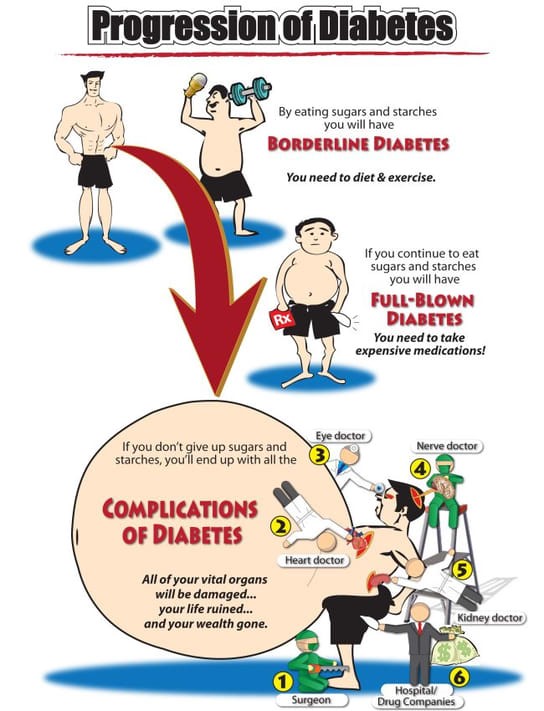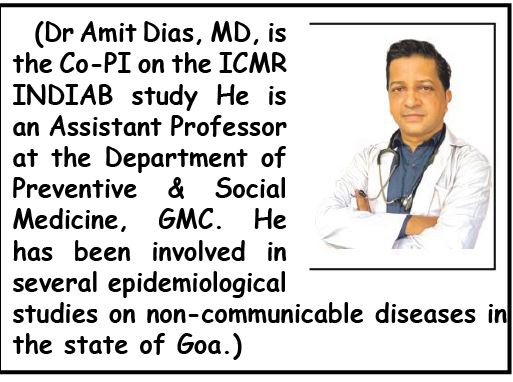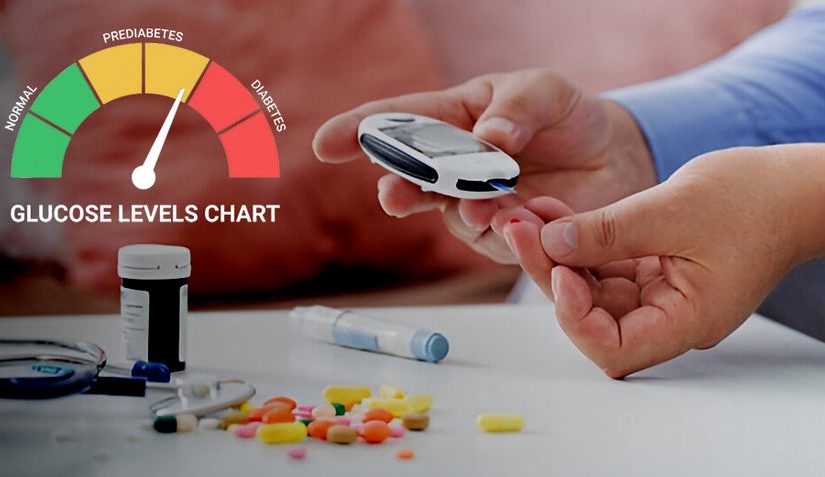Goan Observer interviews DR AMIT DIAS…
This week the government of Goa took yet another step to fight the diabetes epidemic in the state by entering into a public-private partnership with Novo Nordisk. We spoke to Dr. Amit Dias who is the co-principal investigator of the ICMR INDIAB study recently published in Lancet Endocrinology, he says “There is a lot we know about diabetes today, it time we do something about it. Diabetes can be reversed!” Here’s an informative interview:
Goan Observer: Let’s start by trying to understand the main findings of the ICMR- INDIAB study. Can you give us a snapshot especially concerning Goa?
Dr Amit Dias: The study was well designed and data was collected from a representative sample from various parts of India including Goa. The concerning finding of the study is that Goa has the highest prevalence of diabetes in the country. According to our study, it was 26.4% above the age of 20 years. The study was conducted on a total of 113,043 individuals from all over India (79,506 from rural areas and 33,537 from urban areas). The prevalence of diabetes and pre-diabetes for the whole country was 11.4% and 15.3% which is much lower than the findings in Goa.
Q: What is the burden of diabetes?
A: It’s a huge problem and is rapidly growing in recent times. According to the WHO, 1 in 10 people have diabetes. The global estimate is around 537 million with this disease. Almost 1 in 2 adults with diabetes (44%) remain undiagnosed. More than 1.2 million children and adolescents in the world have been diagnosed with Type 1 diabetes. Over 90% of diabetics are type 2 diabetics. We recently published the results of the ICMR INDIAB study which was led by Dr Ankush Desai, professor, at the Department of Endocrinology at the Goa Medical College & Hospital in Panaji. However, where there is rain, there is a rainbow. We have a lot of evidence from the CARRS study that diabetes can be kept under control.
Q: That is a huge burden. Can we reverse diabetes?
A: Yes, a lot of evidence now indicates that we can reverse diabetes and people can live a diabetes drug-free life. However, it’s important to note that while certain lifestyle changes and interventions can effectively manage and even potentially reverse type 2 diabetes, the term “reversal” can be interpreted differently. It typically refers to achieving normal blood sugar levels without the ongoing need for medication. For reversing diseases we need to focus on lifestyle modifications, weight loss and improving insulin sensitivity.
Q: Can you throw more light on how exactly we can reverse diabetes?
A: The formula is simple and is something you have heard before and know. The difference is made by following the advice and not just knowing it. Here are some of the suggestions for reverse diabetes.
Lifestyle Changes:
Diet: Adopting a healthy, balanced diet is crucial. For example, the Mediterranean diet has shown benefits in managing diabetes. Emphasize whole foods, fruits, vegetables, lean proteins, and complex carbohydrates while minimizing processed foods, sugars, and saturated fats.
Exercise: Regular physical activity helps improve insulin sensitivity and can contribute to weight loss. Both aerobic exercises (for example, walking, jogging) and resistance training have proven beneficial.
Weight Loss: Achieving and maintaining a healthy weight is often a key component of diabetes management and potential reversal. The Diabetes Remission Clinical Trial (DiRECT) has demonstrated that weight loss through a very low-calorie diet can lead to diabetes remission.
Bariatric Surgery: In some cases, particularly for individuals with severe obesity and type 2 diabetes, bariatric surgery (such as gastric bypass or sleeve gastrectomy) has resulted in diabetes remission. The mechanisms involved are not entirely understood, but changes in gut hormones and metabolic improvements are thought to play a role.
Intermittent Fasting: Some research suggests that intermittent fasting can improve insulin sensitivity and glucose control. The 16/8 method, where individuals fast for 16 hours and eat during an 8-hour window, has been explored in diabetes management.
Medication Management: Medications such as metformin are commonly used to manage diabetes. However, in some cases, especially during the early stages of the disease, careful medication management combined with lifestyle changes may contribute to achieving normal blood sugar levels.
Individuals with diabetes need to work closely with their healthcare team, including endocrinologists, to tailor an approach that suits their specific needs and health conditions. Regular monitoring of blood glucose levels and adjustments to the treatment plan are critical aspects of diabetes management.
Research and clinical guidelines in the field of endocrinology are continually evolving, and it’s recommended to consult the latest medical literature and guidelines for the most up-to-date information on diabetes management and potential reversal.

Q: You mentioned about the CARRS study, what it is about?
A: The CARRS trial was designed to develop a most effective, scalable model for chronic disease care that integrated with the existing healthcare services, without restructuring entire health systems.
People with diabetes often have co-morbidities such as obesity, hypertension, deranged lipids, cardiovascular disease (CVD) or its risk factors, blindness, non-traumatic amputations and kidney failure. What we need to know is that these inter-related risk factors and co-morbidities result in a multiplicative, rather than additive, amplification of risk. The CARRS trial was designed to improve the quality of care for people with diabetes.
Q: Do we always need to take medications? What are the possible complications if we don’t?
A: The simple answer to this question is to do what your doctor told to you to do. If you do not comply with treatment, the blood sugars can rise rapidly. Diabetes can lead to several life-threatening complications such as heart disease, stroke, kidney failure, amputations, etc. It can also cause nerve injury (neuropathy), eye (retinopathy) and foot problems, ulcers, etc.
Q: What is your message for our readers?
A: Adopt a healthy lifestyle. Diabetes is a wake-up call to tell you that your diet, exercise, and lifestyle are not adequate and need to be changed. We need to screen and detect it early and adopt measures to reverse diabetes. A lot more attention needs to be given to pre-diabetics to prevent the conversion. Diabetes care should be made an integral part of the health and wellness centers established all through the state.
We now have a lot more effective medications to treat diabetes and keep it under control. The management of diabetes is not on medication alone — it includes diet, exercise compliance with medication and constant monitoring.

